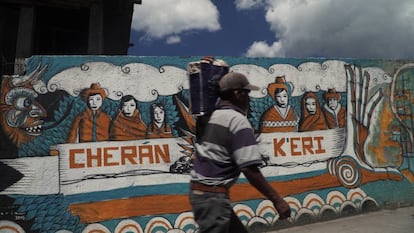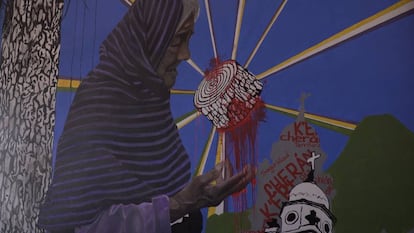How a Mexican town cut illegal loggers down to size
The indigenous community of Cherán has taken back control of its forests and its future


Five years ago the people of Cherán decided to end the relentless deforestation of their surrounding area, along with the rule of the political parties that had allowed the ruthless clearfelling to take place.
The town of Cherán, which is located in Mexico’s Michoacán state, is now a unique example of self-rule in the country. Locals elect their own neighborhood representatives every three years, state police don’t enter and federal attorneys only arrive in the case of rare serious crimes.
They were going to hang the loggers
Cherán councilor
This dramatic change in circumstances came in 2011, after years of what locals describe as the “devastation” of the local environment. Rubén Fabiola Madrigal, one of the officials responsible for security in the town, said that “200 trucks loaded up with tree trunks” used to arrive every day.
José Ignacio Soto, who runs the municipal plant nursery, said that the local hill of San Miguel would resemble a highway. The loggers would bring down the big tree trunks and burn the rest. “They wanted to clear the land to grow avocados,” he explains.
“We are going to finish with your forest and then carry on with your women,” local council member Enéndiro Santa Clara remembers the men from the logging firms saying.
There are no precise figures on how much forest was lost before the clearfelling stopped but figures from the National Autonomous University of Mexico suggest some 20,000 hectares in the region were logged from 1976 to 2005. That is equivalent to the size of the city of Buenos Aires.
The history of political parties in Cherán is similar to that of other municipalities in Mexico’s poor south east. For most of the 20th century the city was controlled by the Institutional Revolutionary Party (PRI), and after a 20-year period out of office the party returned to power in Cherán in 2007. The following year, residents tried to remove the PRI from office but were unable to do so.

In April 2011, however, there was a revolt. According to locals, it all started when a group of tired young men and several young women coming out of a church service stopped one of the logging trucks that was coming into town. A fierce argument then erupted with other locals joining in.
“They were going to hang the loggers,” explains Pedro Jiménez from Cherán’s neighborhood council.
In the wake of the revolt, the town’s four neighborhoods organized themselves around bonfires, in a case of “fire against fear.”
The neighborhoods then formed an assembly, which in turn gave rise to a coordinating committee. Political parties made way to the customs of the indigenous community while federal police were replaced by a local force elected by the residents of Cherán. In 2012, the town’s first communal government was formed, along with a grand council. Other committees have since emerged to control other aspects of life in the town.
Taking a stand against environmental bandits is a risky endeavor in Latin America. According to the NGO Global Witness, 580 environmental activists were killed on the continent from 2010 to 2015. And Cherán official Irineo López Tapia confirms that the transition to self-rule was far from trouble-free.
The National Autonomous University of Mexico estimates loggers cleared an area the size of Buenos Aires
“Up until 2012, people were disappearing and there were a number of homicides but these were related to organized crime,” he says.
Since then the situation has calmed down. “The most serious case we have had since then was vehicular homicide,” he adds.
The minor nature of other crimes in Cherán is in stark contrast to the situation in the state of Michoacán, which has seen 678 murders in 2016 to date, up 68% on last year, and suggests the town is a success story.
But local authorities point out that alcoholism remains a big problem in the town, with up to 25 people being arrested on Saturday nights for drunkenness.
This drinking has also led to domestic violence, a problem the local government hopes to solve with the established of a woman’s council, a program funded to the tune of $24,000 from a total budget of $1.9 million.
But the extraordinary fact is that domestic violence is being talked about at all, given that in Mexico the national media recently covered a story of a police helicopter being shot out of the sky by gangs, or where a mayor is suspected of having ordered the deaths of 10 people and the subsequent burning of their bodies.
English version by George Mills.
Tu suscripción se está usando en otro dispositivo
¿Quieres añadir otro usuario a tu suscripción?
Si continúas leyendo en este dispositivo, no se podrá leer en el otro.
FlechaTu suscripción se está usando en otro dispositivo y solo puedes acceder a EL PAÍS desde un dispositivo a la vez.
Si quieres compartir tu cuenta, cambia tu suscripción a la modalidad Premium, así podrás añadir otro usuario. Cada uno accederá con su propia cuenta de email, lo que os permitirá personalizar vuestra experiencia en EL PAÍS.
¿Tienes una suscripción de empresa? Accede aquí para contratar más cuentas.
En el caso de no saber quién está usando tu cuenta, te recomendamos cambiar tu contraseña aquí.
Si decides continuar compartiendo tu cuenta, este mensaje se mostrará en tu dispositivo y en el de la otra persona que está usando tu cuenta de forma indefinida, afectando a tu experiencia de lectura. Puedes consultar aquí los términos y condiciones de la suscripción digital.








































